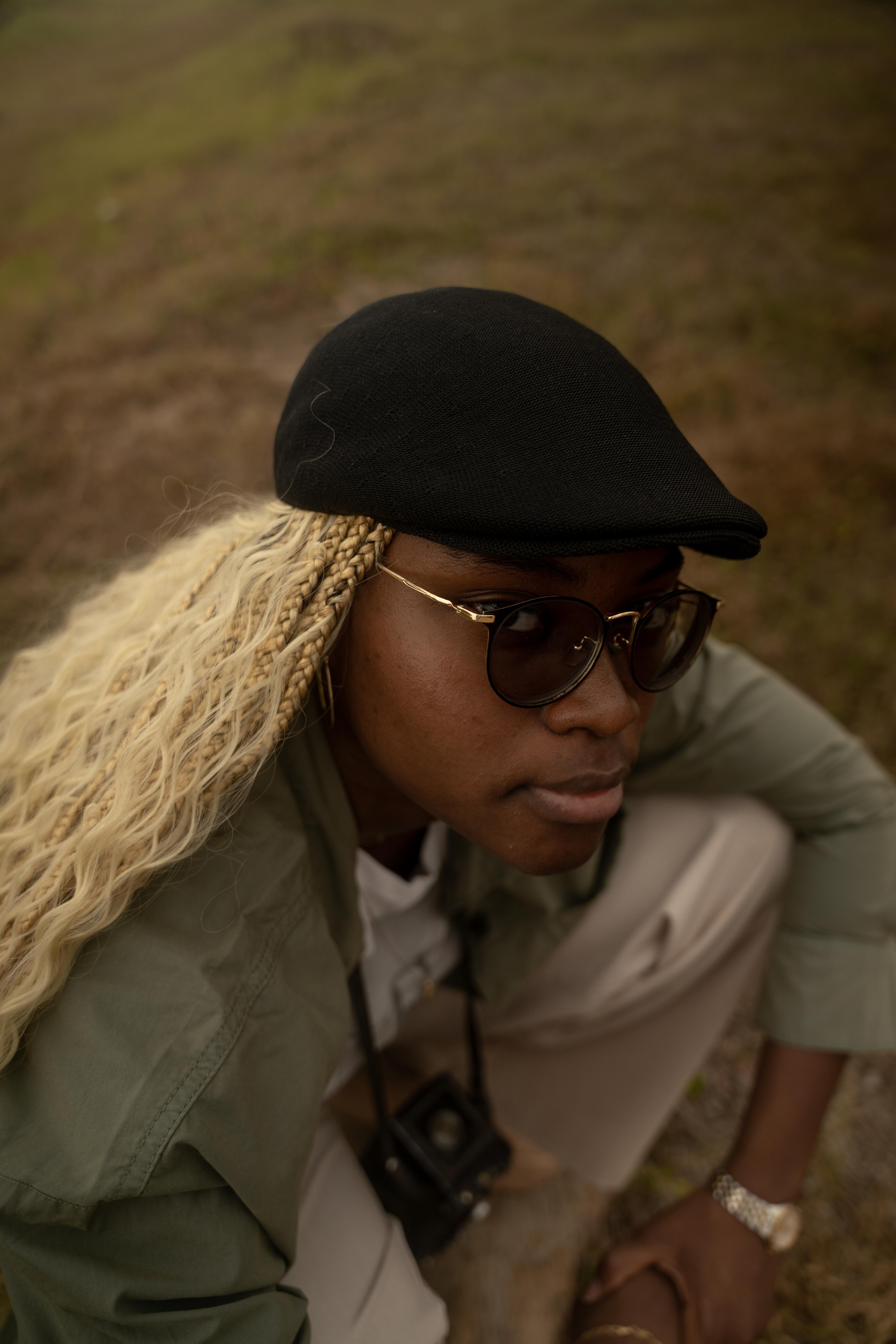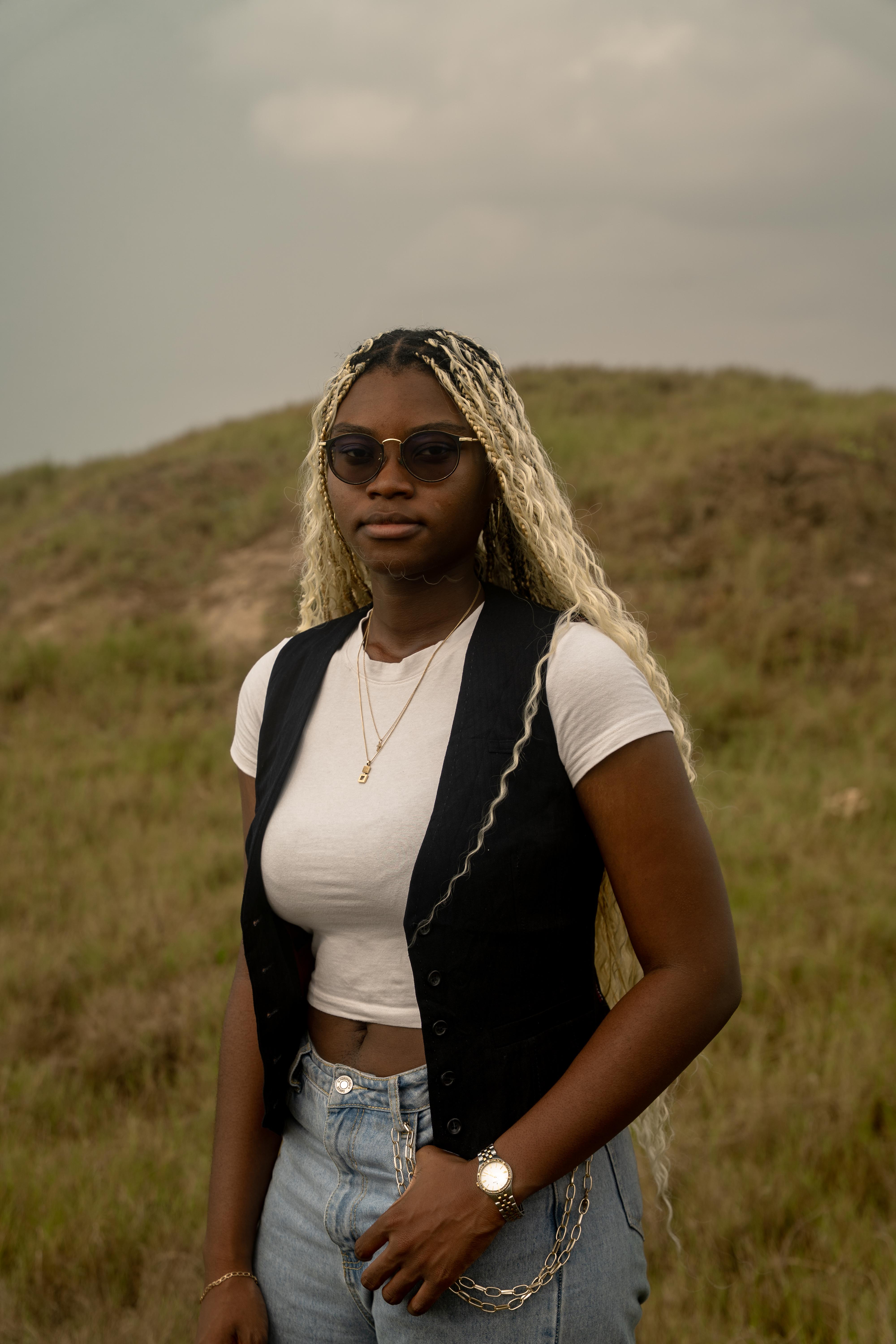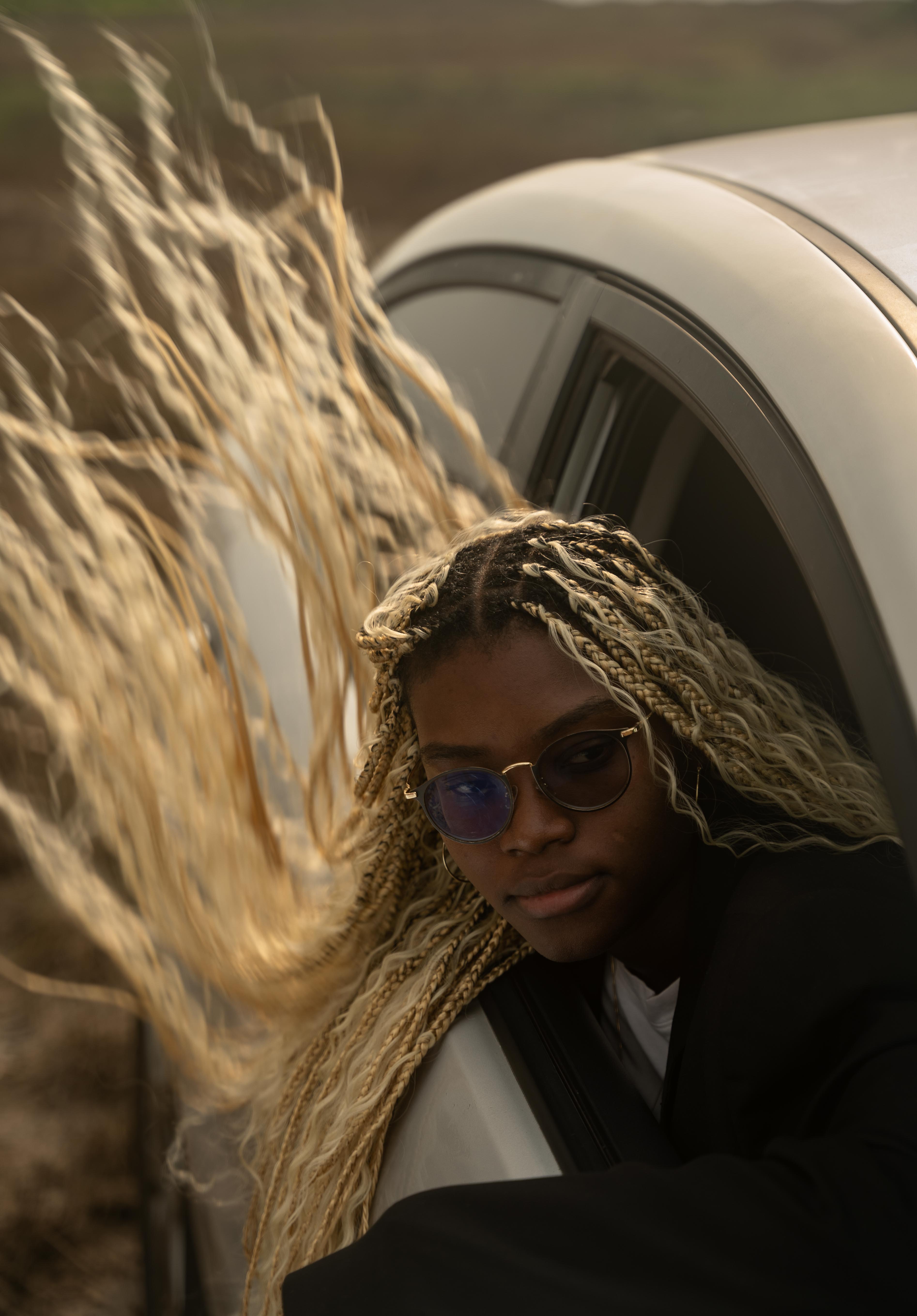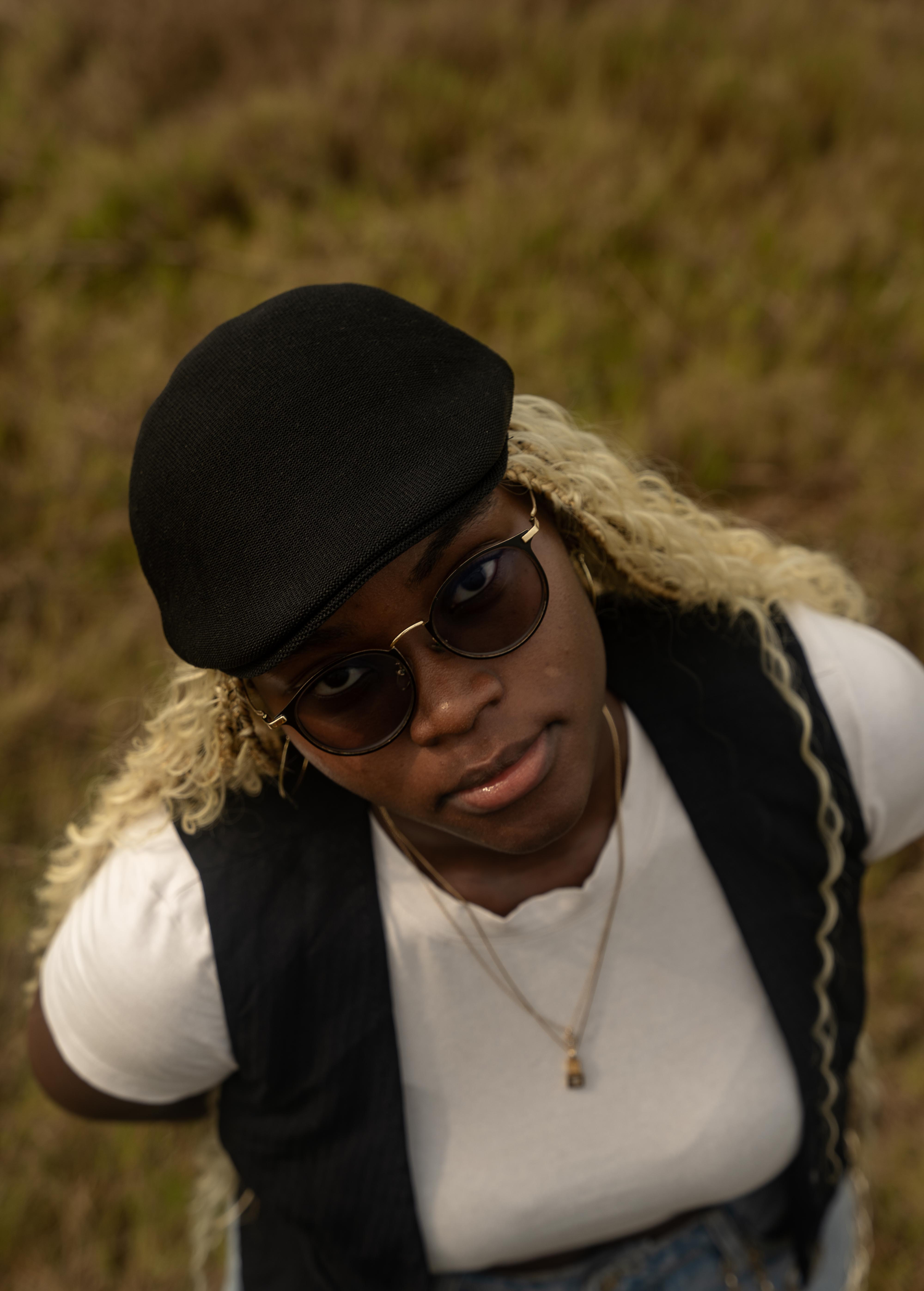
“I am hoping that the songs in this upcoming project encourage people, especially young women.” – Mēl
“I am hoping that the songs in this upcoming project encourage people, especially young women.” – Mēl
During my research in preparation for this interview with Mēl, one thing that stood out to me from her Spotify bio is her dedication to bringing more women into the male-dominated music industry. This is not just a fancy statement, as it led to the creation of her debut EP, For Melanin Girlies Vol.1— a five-track, enthralling project that features various Ghanaian female artists and creatives. With this project, she showcases her intricate music production skills and her ability to create a cohesive body of work, despite the multiple genres and artists involved.
Born Akua Boa-Amponsem, Mēl is a Ghanaian music producer, composer, art director, and multi-instrumentalist who is also a member of the renowned Ghanaian music group, 99PHACES collective. She made her production debut with CozyPols’ “233 Shokoto” and also produced Anabel Rose’s “Lungs,” which earned her a spot on OkayAfrica’s Best Afrobeats Songs of 2024 list—highlighting that Mēl’s production prowess is one to watch. This year, she isn’t slowing down, having released two tracks — “IDC” featuring Lali x Lola and Jamz, and “Thamanga” featuring Kim of Diamonds and Stella Sena — from the soon-to-be-released For Melanin Girlies Vol. 2. Unlike the first edition, the new project will feature female artists from across Africa, making it a commendable effort by the producer to collaborate with and spotlight more female artistes.
In this interview with Get Unruly, Mēl discusses her musical journey, the creative process behind her previous project, For Melanin Girlies Vol. 1, and what to expect from her and the 99PHACES collective.
Congratulations on releasing a few singles from your soon-to-be-released project. How does it feel to share new music with the world, and how has the journey been from Vol. 1 to Vol. 2?
The journey has been an interesting experience. It comes with a lot of emotions — you're anxious, unsure if people will like your music, but at the same time, you're happy that you're doing something you love and creating work that will hopefully inspire others. Overall, it has been a rollercoaster — not always smooth, but I think I’ve enjoyed it most of the time.
For our readers hearing about you for the first time, can you tell us a bit about yourself? Who is Mel?"
The first thing I’d say is that I’m a very awkward person. I think I’d like to describe myself… I was going to call myself an artist, but I have multiple interests. There’s music, I draw, I do digital art, and I’m also into techno electronics. I also like science.
Walk me through your childhood. How did you discover music? At what point did you decide to pursue it professionally?
I think my earliest memory was when I was three years old. I was living with my grandparents at the time, and someone came to visit them with a guitar. I became obsessed with it. I tried to play it, but obviously, I was just three—the guitar was too big for me, so I was basically hugging or clumsily handling it.
Around that same time, I also had a cassette with songs on it. My favourite song was one about musical instruments, and I still sing it to this day. The drums, the trumpet, and all the other instruments just made me happy.
I started learning to play the guitar when I was eleven, then later picked up the drums. I began recording guitar videos and posting them on Instagram just for fun. That eventually led to me making little beats or tracks to go along with the recordings.
Over time, people started asking for the beats, so I began creating them more intentionally. I thought, “Oh, this is actually fun—let me just do it.” Then I joined 99PHACES. It’s been about two to three years since I started making music professionally, and so far, it’s been chill.
Your decision to pursue music may have been influenced by your aspirations, but I’m curious about your biggest musical influences and how they’ve shaped your sound.
I remember that, as a child, my dad really loved old-school R&B artists like Boyz II Men so I naturally gravitated toward that kind of music. My mom, on the other hand, was very adamant about listening to gospel music, so I was exposed to a lot of it. There’s the traditional gospel sound, Black gospel, and even contemporary worship like Hillsong — I particularly loved the guitars they used, which brought some pop and rock influences into my taste.
I also listened to a lot of hip-hop and radio, so I was always absorbing different styles and ideas. A few artists who have significantly impacted my musical journey include, first and foremost, Amaarae. She’s Ghanaian, and she inspired me to create the kind of music I genuinely enjoy. Beyond that, I’m often inspired by whoever I’m currently listening to.
In 2024, platforms like The Upper and Ghana Music named you as one of the best music producers in Ghana. Also, OkayAfrica named Anabel Rose’s “Lungs” — a song you produced — as one of the best songs released from Africa. How did all these make you feel?
I was happy and thought, “Oh, people are paying attention and noticing the stuff I create.” I feel like the things I make are unorthodox — they stand out — so I don’t always think a lot of people enjoy or understand them because they’re very different. But it’s nice. So it was great to see that it’s something people actually enjoy.
Last year, you collaborated with multiple Ghanaian female artistes and other female creatives on the project For Melanin Girlies. What motivated your decision to create a project that brings together some of the best talents in Ghana?
It’s something I discussed a few years ago with my manager, Jasper. We were brainstorming different ways I could release music, and one of the ideas we came up with was for me to create a tape with other women—to encourage collaboration among us. It’s not very common to see many women in the industry working together, and we aren’t that many to begin with. So we thought, why not just come together, get to know one another, and build each other up? I think that’s where the concept for For Melanin Girlies began. I really liked the idea, and I believe we should support one another as women in the industry because, honestly, we only have each other. The men might not understand—so let’s unite and uplift one another.
How did you select the collaborators? Also, are there any artists, either locally or internationally, that you are eager to collaborate with in the future? If you could feature any artist—local or international—who would it be?
It came down to two things. First, I made a list of the different genres I wanted to explore or had struggled with. Then, I looked at a list of artists I had worked with—though not officially released music with at the time. Some I had recorded guitar tracks for, while others I had performed with at some point. I matched the genres to the artists and reached out to them with the idea. Thankfully, they liked it too.
The first artist on my collaboration list—the one I’d love to feature first—is Amaarae. I’d also love to work with Moliy. Internationally, there are quite a few, but I’ve grown fond of Hope Tala and would really like to work with her. I’d also love to collaborate with Jacob Collier, GuiltyBeatz, and Tems.
Did you encounter any challenges while working on the project? How did you push through any creative blocks you might have faced?
Yes, I did. The funny thing about the project is that I was way behind schedule—I didn’t even know when it was coming out. I was just talking to my manager when he mentioned that my next single was being released the following month. So I started listening to different genres and creating various playlists to spark ideas. For me, the best way to deal with things is to make music. So I poured everything I was feeling into the beats, into the process. And now, we have For Melanin Girlies.
In the project, you combined multiple themes, genres, and various collaborators, how did you ensure the project remained a cohesive one?
The first thing I did with the artists was to tell them that we were coming together as women to express ourselves. So, I felt that whatever story they told—or would tell—was their experience as women. For instance, in “Breathe,” the girls were talking about how they were tired and just wanted to relax and be free, and a lot of women can resonate with that.
I’m the firstborn and the first girl in my family, and in a typical African household, you’re always doing chores and getting exhausted—but you still just want to breathe. Many people can relate to that experience. It’s also something that transcends genre; at the core, you just want your space. So, I let them express themselves however they wanted, because I believe that whatever a woman is saying is her story and perspective—something tailored to us that others can still relate to.
You are currently working on the second installment of For Melanin Girlies, and you’re featuring female artists from other African countries. What should listeners expect from the project in terms of quality, length, and collaborators?
There will be more tracks, and you might discover one or two emerging artists worth keeping an eye on. Basically, be among the first to hear about them—and let that inspire you to explore more of their music.
With the release of “IDC” and “Thamanga,” is there a particular message or feeling you hope listeners take away from the project?
Most of the time, I hope the songs I work on help people relax, and with this upcoming project, I truly hope the songs encourage people—especially young women. There are so many talented individuals out there, so many people who make beats and create better work than I do, and I feel they deserve more recognition because the world needs to hear their gifts. That’s what I really hope happens. Also, each song has its own theme, so I believe there’s something for everyone.
You’re a part of the 99PHACES Collective. How has your journey in the group been? And how has being part of the collective impacted your career?
It’s great having people around who understand where we’re all coming from. We’re all trying to make music for our own reasons, so the journey has been a bit of a rollercoaster. But it’s also been meaningful for me because I’m not someone who naturally enjoys working with others. Being in a group of nine to ten people has taught me how to navigate collaboration. They’ve helped me a lot — which is really the whole point of a collective. I was introduced to Jasper, my manager, through the boys — Murphy and Freddy. Anytime you need help, you can just reach out to someone. Everyone plays a role so we can all support one another.
In your Spotify bio, you mentioned that you're passionate about bringing more women into the male-dominated music industry. Can you share how you're doing this?
So far, I’ve only hosted one workshop, which was last year, where I met a few women who produce music. I might have another one this year if things go well. I can’t afford to take on interns at the moment, but whenever I meet someone who’s into music, I’m always enthusiastic about sharing whatever I have—whether it’s a sample pack I bought or got for free, I’ll give it to them and teach them what I know. I also try to connect them with other artists I think they’d work well with. I hope to host residencies for producers in the future. I also have a few friends who play instruments, so I try to link them up too.
What are some of the challenges you have faced in the industry?
Personally, one of the biggest challenges I face is access to studio space and studio time. I don’t have a dedicated studio to work in, so I usually make my beats in my room. After that, I meet with the artist at a recording studio. However, our sessions often run late into the night, and it’s not very safe for me to be out at 1 a.m. recording a song.
Sometimes, there are a lot of men in the studio at midnight, and as a woman, you always have to be on guard. That’s why I try to have another woman around me during sessions—someone I can talk to and feel safe with.
From your experience in the music industry, what advice would you give to anyone trying to enter it?
When you get an idea, just do it. There will always be people who tell you not to pursue it because it’s not what’s trending or selling at the moment, but you don’t have to follow the crowd. If something is on your heart, you should go for it—the right people will gravitate towards you.
Also, be kind to everyone around you and try to learn as much as you can about the industry. There are many hidden gems that most of us don’t know about and are still discovering. If you really want to make it, you should take the initiative and create something for yourself.
What’s one piece of advice someone has given you that you still hold dear or constantly remember?
I think it would be from Obed of Super Jazz Club. I met him when I was trying to learn how to produce, and he would always tell me to create — that it didn’t have to be perfect — and that’s what I’ve been doing ever since. I also worked with Rvdical the Kid a few years ago, and I remember asking him how he was able to work on his drums because I really liked them. He told me not to overthink it and that everything would fall into place. I think these are the things that have stuck with me the most: just do it, don’t overthink — you’ll be fine.
Many producers and artists have shared that they find joy in creating music because it allows them to express their emotions and experiences. For you, what aspects of making music do you find most fulfilling?
For me, it’s the act of creating itself. When I start with a blank slate, it feels like stepping into a kitchen and asking myself, “What ingredients am I going to use? What dish will I cook? What will I make today?” By the time I’m done, that blank space is filled with something meaningful—something others can connect with. The process of combining small, different elements to create a complete piece is what makes me happy.
What are you most looking forward to with your future projects, and what should fans expect from Mel besides the upcoming Melanin Girlies Vol. 2?
I really hope to connect with new producers. From the last tape, I had the chance to meet a few female music producers. Not just producers, but also instrumentalists. 99PHACES is also gearing up to release new music. We have a tape coming out later this year, and people should definitely anticipate it because it's bigger and better than the last one. Additionally, there might be a few singles and EPs I worked on that could be released, depending on the artists.




Comments